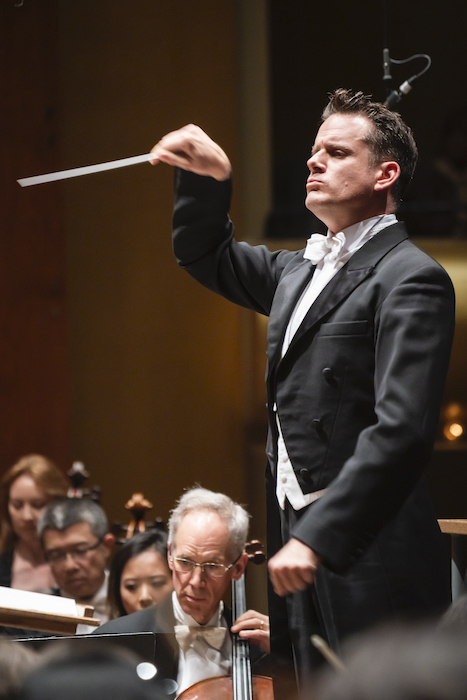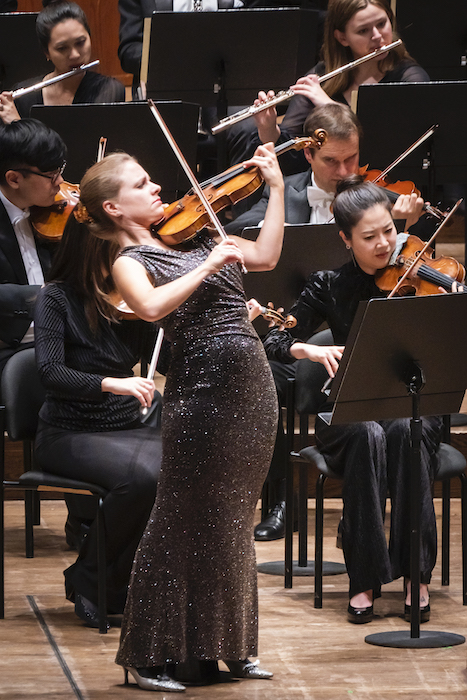Jordan, Fischer and Philharmonic illuminate warhorses with gleaming brilliance

The most memorable feature of the Metropolitan Opera’s revival of its Ring cycle earlier this year was the music making and the great orchestral playing under Philippe Jordan in the pit. The impression that Jordan—an old school conductor with as much, if not more, experience in opera as orchestral music—left was that of a musician with an uncannily intuitive connection to the music he was directing.
That impression was revisited and intensified Wednesday night when he took the podium in front of the New York Philharmonic at David Geffen Hall and delivered the finest concert so far in the orchestra’s season.
Jordan’s capsule bio in the program book had no mention of any premieres he’s brought to the concert hall; his métier is common-practice period repertoire. His podium manner is contemporary, collegial and self-effacing, but the results were spectacular.
This was a program of the classics, with a focus on the late 18th-early 19th century—Mendelssohn’s Violin Concerto, with Julia Fischer, Beethoven’s Symphony No. 7, and, to start, Prokofiev’s “Classical” Symphony No. 1.
Finished in 1917, Three years before the premiere of Stravinsky’s Pulcinella, Prokofiev was already back to the rules of sonata-allegro form, and his Symphony No. 1 is a modern recreation after the style of Haydn and Mozart. Yet it is not derivative; modeled on their lessons, it is original and one of the most wonderful symphonies in the repertoire, with the composer’s personal stamp of wit, tenderness, and 20th century ideas of rhythm and displaced counterpoint.
What’s is very much of the 18th century about it, especially Mozart, is the energy, which comes directly out of the old-fashioned structure, which cascades from the opening D Major chord all that way back to that harmony at the final downbeat.
The Philharmonic played with striking life coming through the ensemble—great warmth and immediate vitality. Jordan’s tempos felt perfect, opening with a trot, keeping the slightly syrupy melody of the Larghetto flowing until the moving, suspended minor key passage. The connecting gestures in the Finale, especially the upward-ripping eight notes, expressed greater meaning than one usually hears.
The experience was a pleasure in and of itself, and created heightened sensations for the music to come.
In the Violin Concerto, Jordan’s style was based on Mendelssohn’ own preference—no pause between the second and third movement ( as well as between the first two). The effect was to take the anticipations and satisfactions of hearing familiar music unspool in time and make the experience at much deeper and more immersive. One of Jordan’s few and judicious moments of intervention came with holding the chords that open the first and Andante movements for a hair longer than the score indicates, and this produced considerable atmosphere. The orchestra’s playing sounded more alert and spontaneous, as if there were surprises waiting around well-trod corners.

Add Fischer’s tremendous playing to the mix. She was one with Jordan in the manner in which her playing sounded natural and in the moment. Her violin sang with a honeyed tone, her execution and articulation were virtuosic, effortlessly clear and smooth, and there was a serous and gripping concentration to her playing throughout.
The cadenza had weight of meaning, but no heaviness at all in the sound of the music, and soft, fast music that brings the violin back together with the orchestra was breath-taking and full of suspense. The combination of tempo and her technique in the Allegro molto vivace, march-like music in the finale gave one the giddiness of seeing a dangerous, daredevil act pulled off almost with a sense of comedy. The concerto is full of intense music and stormy emotions, and Fischer, Jordan, and the orchestra made it all sound beautiful without glossing over any moment or pandering to rote expectations.
Jordan’s intuitiveness means that there’s no fussiness when he’s at the podium, nor any feeling that the music is meant to prove a point, which Wednesday meant that having Beethoven finish the concert had nothing to do with the upcoming performances commemorating the composer’s death—it was a matter of just having a great piece of music to play.
For all its greatness, Beethoven’s Seventh is frequently misapprehended in performance, with musicians taking a sectional view of music that is all about forward motion—controlled velocity, force, and the contrast between wildness and repose.
With Jordan, the Philharmonic became an arrow cutting through space, right on target.The orchestra segued from the exhilarating first movement to the exquisite Allegretto, and here Jordan had the cellos play the opening statement with blunt phrasing, laying the notes down like bricks in a wall. As the harmonic motion developed and rose through the strings, that small contrast produced an enormous range of feelings, all sincere, without pathos.
The challenge of the finale is to play the hurtling rhythms with power yet keep them light and moving. Modern orchestras frequently bog down. Yet the Philharmonic flew through these, the dotted rhythms and accents had the impact of a broadsword and the weight of a stiletto, the violins digging into the swirling underpinnings with frenzied energy. The musicians were clearly involved in the thrill of this music-making. Just after the final chord, Jordan embraced concertmaster Frank Huang and associate Sheryl Staples—a cordial handshake was inadequate to the experience.
The program will be repeated 7:30 p.m. Thursday, 2 p.m. Friday, and 8 p.m. Saturday nyphil.org
Posted Nov 06, 2019 at 1:55 pm by Geo.
I remember that Philippe Jordan conducted the best Beethoven 7 that I’ve ever heard (of the 10 or so that I’ve heard live), back in November 2005 with the St. Louis Symphony. It had the perfect balance of drive, precision, and orchestral sound. Presumably much the same kind of interpretation was present with the New York Philharmonic.
Posted Nov 12, 2019 at 4:37 pm by Harry Saltzman
I am in total agreement with your assessment of the performances of the Prokofiev and the Mendelssohn. There was, however, one glaring fault with the Beethoven due to the horrible acoustical properties of David Geffen Hall. The blaring trumpets were much too loud during the forte and fortissimo passages. But Maestro Jordan is also responsible, as it is his duty to try to mitigate the hall’s deficient acoustics.